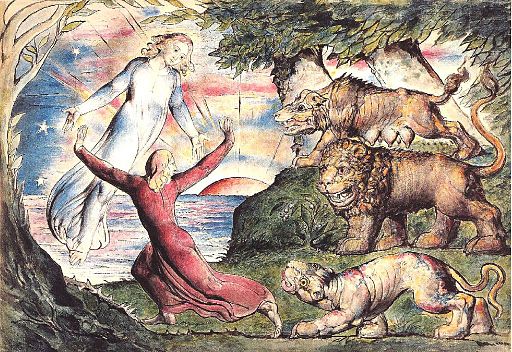The following is an excerpt of an email sent from Art to Will on 14 August 2014.

"
Gustave Doré - Dante Alighieri - Inferno - Plate 4 (Dante meets Virgil)" by Gustave Doré (1832 – 1883) - Dante's Divine Comedy: Hell - Purgatory - Paradise. Illustrations by Gustave Doré, Translation by Henry W. Longfellow, Published by Arcturus Books, 2007. Licensed under Public Domain via
Wikimedia Commons.
As Dante descends back down the slope guarded by the panther, lion, and wolf, he meets Virgil. As Arthur's prospects for stardom dwindle, he discovers Farthington.
Both guides believe that the next step is to bring their charges through the underworld. At that midpoint in life, it's safe to guess that both were trying to attain something that had evaded them up to that point. Dante's banishment from Florence had weened him of his primary focus on politics, and
La Divina Commedia seems to reflect an attempt to reorient his life accordingly.
But, again, as he exits the dark wood of confusion and begins to ascend the mountain (representing some new ambition, perhaps literary achievement?), his ascent is halted by prowling animals. Interestingly, his subsequent path through Hell, Purgatory, and Heaven is set up by St. Lucia, Beatrice, and probably the Virgin Mary--all women. I'm not sure why that makes so much sense, but it does. Men and male characters--with the exception of maybe Hamlet--just go for the gold, which almost always turns out to be fool's gold. As usual, I'm fond of Nietzsche's characterization:
This is something that the Dionysiac man shares with Hamlet: both have truly seen to the essence of things, they have understood, and action repels them; for their action can change nothing in the eternal essence of things, they consider it ludicrous or shameful that they should be expected to restore order to the chaotic world. Understanding kills action, action depends on a veil of illusion--this is what Hamlet teaches us, not the stock interpretation of Hamlet as a John-a-dreams who, from too much reflection, from an excess of possibilities, so to speak, fails to act. Not reflection, not that!--True understanding, insight into the terrible truth, outweighs every motive for action, for Hamlet and Dionysiac man alike...now he understands the symbolism of Ophelia's fate...
I feel that I myself (not Arthur) am more like Dante in this regard. Arthur doesn't have any of those worldly ambitions. But a common midlife realization--sometimes taking the form of a midlife crisis--is that our male
modus operandi is not getting us anywhere, not accomplishing anything. So we are subjected to this experience that seems so counterintuitive to us, that terrifies us: to be dragged in the opposite direction of our dreams and ambitions, toward the "eternal essence of things." And yet, paradoxically, that is how and why the great work finally gets written. Who knows what would have happened if Dante had gotten past the three beasts, grisly counterparts of his benefactresses in Heaven. Safe to say it wouldn't have been as good as the
Divina Commedia. And so, we need to turn our attention away from the hideous aspect of the three beasts and toward the benign influence that frustrates, hampers, and ultimately coaxes us away from Hell-bent ambition and self-sufficiency. Then and only then, having traveled that seemingly opposite path through to its end, do we have the possibility (not the guarantee!) of receiving the original object of our striving, like Kierkegaard's Knight of Faith.
Looking at the present status of the project, it does seem like we have an opening, a way forward. But to what extent will it consist in trying to weave our way past panther, lion, wolf? I want out of the woods as much as the next guy, I want to finally find some way to ascend! This other path--the one I have described--seems darker, obscure. And yet, in a way, that's where the dream was conceived: in darkness. "What I say to you in the darkness, speak in the light; what you hear whispered, proclaim on the housetops" (Mt. 10:27). And so we proceed into the light of day, but inwardly embrace that experience of darkness, which leads us on an entirely different journey. Because we want our proclamation to be somehow true to the original whisper, the original darkness. But how can the dark beauty of those words be preserved in the light of day? Should we shout them up from the bottom of a well?
On the surface of things maybe nothing looks different. It's the anguish of the Kierkegaardian guy who has an existential crisis about whether or not he should go to Deer Park, and then ends up going to Deer Park like all the other plebs in Copenhagen. But because of his experience of inwardness, his action is subjectively different than the others who go to Deer Park as a matter of course, because it's the thing to do. What the Dionysiac man, the Knight of Faith, the thwarted Dante, the middle-aged man, and Hamlet have in common is that they are deprived of knowing the propriety or essential rightness of this or that course. But balanced on that fulcrum, they may finally spy a kind of freedom, something that makes them more than just a "pipe for Fortune's finger."
Whether or not actions in this dark, perplexed, anguished, angst-ridden, hidden, swaddled, crucified state have greater efficacy matters not. In some cases, such an experience of inwardness seems to produce a better result: Dante wrote his
Commedia, Oedipus at Colonus bestows divine blessings. In other cases, it produces the same result: Abraham got his nation, Hamlet avenges his father and purifies the kingdom. In still other cases, it does not produce the desired result: Kierkegaard never got back his would-be bride.
Nietzsche thinks it's a good thing:
[Oedipus at Colonus], afflicted by an excess of misery, abandoned to every misfortune that comes his way as a passively suffering man, is confronted by a superterrestrial cheerfulness that descends from the gods, which suggests to us that the hero, through his passivity, has found his supreme activity, the effects of which will resonate far beyond his own life, while his conscious strivings in his former life led him only to passivity.
Most of the above discussion has been in tragic terms, but per our earlier discussions I would say this experience of darkness is ultimately and fundamentally comic, no different from the Sweet World, the Forest of Arden, the Garden of Eden. How silly to think of ambition and self-sufficiency
sub specie aeternitatis, in the arms of a loving Creator and Redeemer! Do the three sainted women just appear like prowling beasts, mortal enemies of our ambition?
How tragic that would be--and yet at the same time, how comic!










